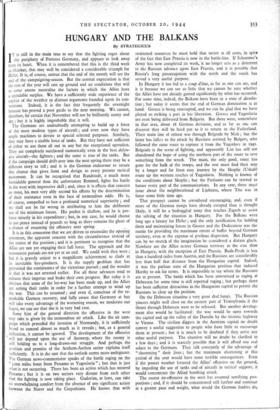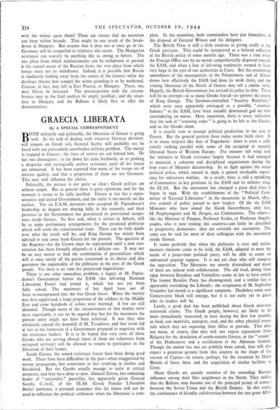HUNGARY AND THE BALKANS
By STRATEGICUS
IT is still in the main true to say that the fighting rages about the periphery of Fortress Germany, and appears to look away from its heart. When it is remembered that this is the third week in October, that may well be considered a considerable triumph for Hitler. It is, of course, untrue that the end of the month will see the end of the campaigning-season. But the normal expectation is that the rest of the year will cast up ground and air conditions that will to some extent neutralise the factors in which the Allies have a spendable surplus. We have a sufficiently wide experience of the caprice of the weather to distrust arguments founded upon its con- ventions. Indeed, it is the fact that frequently the overnight forecast has proved a poor guide to the next morning. We cannot, therefore, be certain that November will not be brilliantly sunny and dry ; but it is highly improbable that it will.
The Germans are undoubtedly attempting to build up a force of the most modern types of aircraft ; and even now they have ample machines to devote to special selected purposes. Similarly, they may have a sizable force of tanks. But they have not sufficient of either to use them all out in any but the exceptional operation. They are completely outclassed numerically even in the best defen- sive aircraft--the fighters ; and the same is true of the tanks. But if the campaign should drift over into the next spring there may be a different story to tell ; and it is the German endeavour to secure this chance that gives form and design to every present tactical movement. It can be recognised that Rundstedt, a much more formidable general than the unfortunate Rommel, fights his battle in the west with impressive skill ; and, since it is effects that concern us most, his men very ably second his efforts by the determination of their resistance even in the face of tremendous odds. He 'is, of course, compelled to face a profound numerical superiority ; and we shall not be far wrong in attributing to him the deliberate use of the minimum forces. His pocket is shallow, and he is per- force miserly in his expenditure ; but, in any case, he would choose to use pence instead of pounds so long as there remains the ghost of a chance of resuming the offensive next spring.
It is in this connexion that we are driven to reconsider the opening statement, the apparent concern with the circumference instead of the centre of the position ; and it ii pertinent to recognise that the Allies are not yet engaging their full force. The approach and the manoeuvre periods are not yet at an end. We could wish they were ; but it is gravely unjust to a magnificent achievement to chafe at its inevitable bye-products. It is the supply problem that has prevented the continuance of the victorious pursuit ; and the wonder is that it was not arrested earlier. For all these advances tend to exhaust their impetus and brake their own progress. But today it is obvious that some of the lee-way has been made up, and the Allies are setting their ranks in order for .a further attempt to wind up the war. This can be assumed ; and even if, conscious of the re- markable German recovery, and fully aware that Germany at bay will take every advantage of the worsening season, we moderate our hopes, we can see that she is in very bad case.
Some hint of the general direction the offensive in the west may take is given by the tremendous air attack. Like the air cam- paign which preceded the invasion of Normandy, it is sufficiently broad to conceal almost as much as it reveals ; but, as a general indication, it cannot be ignored. The development of the offensive will not 'depend upon the use of Antwerp, where the enemy is still holding us to a long-drawn-out struggle. And perhaps the position and promise of the Arnhem-Aachen sector explains itself sufficiently. It is in the east that the outlook seems more ambiguous. The German news-commentator speaks of the battle raging on the " 3,000 miles front from Petsamo to Yugoslavia " ;. but that is just what is not occurring. There has been an action which .has secured Petsamo ; but it is on two sectors very distant from each other that the fighting is now taking place. Guderian, at least, can take no overwhelming comfort from the absence of any significant action between the Narev and the Carpathians. He knows that with
straitened resources he must hold that sector at all costs, in spite of the fact that East Prussia is now in the battle-line. If Schoerner's Army has now completed its work, it no longer acts as a deterrent to the Russian advance upon East Prussia, and it is possible that Russia's long preoccupation with the north and the south has served a very useful purpose.
In Hungary it has led to a coup d'etat, as far as one can see, and it is because we can see so little that we cannot be sure whether the Allies have not already gained significantly by what has occurred. For some time, indeed, the Balkans have been in a state of dissolu- tion ; but today it seems that the end of German domination is at hand. Greece is being reoccupied, and we can be glad that we have played so striking a part in her liberation. Greece and Yugoslavia are even being delivered from Bulgaria. But there were, somewhere in that area, about 18 German divisions, and as far as one can discover they will be hard put to it to return to the Fatherland.
Their main line of retreat was through Belgrade by Nish ; but the latter has fallen to the attack by Russians assisted by Bulgars, who followed the same route to capture it from the Yugoslays in 1941.
Belgrade is the scene of fighting, and apparently List has still not abandoned the hope of using the northern part of the route to save something from the wreck. The main, the only good, route has gone for the bulk of the troops, and the rest must find their way by a longer and far from easy journey by the Skoplje (Uskub) route up the western reaches of Yugoslavia. Nothing is known of the conditions about Skoplje ; but the Partisans can be trusted to harass every part of the communications. In any case, these must issue about the neighbourhood of Ljubiana, where Tito was in force some- little time ago.
That prospect cannot be considered encouraging, and, even if more of the German troops have already escaped than is thought likely, it will be a bedraggled army that reaches Zagreb to assist the salving of the situation in Hungary. For the Balkans were long ago a luxury for Hitler ; and the only justification for holding them and maintaining forces in Greece and the Dodecanese was the mania for providing the maximum extent of buffer beyond German territory, even at the expense of perilous dispersion. But Hungary can by no stretch of the imagination be considered a distant glacis.
Nowhere are the Allies nearer German territory in the east than in Hungary, with the exception of East Prussia. Buda-Pesth is less than a hundred miles from Austria, and the Russians are considerably less than half that distance from the Hungarian capital. Indeed, it was the parlous state of the Hungarian position that induced Horthy to ask for terms. It is impossible to say where the Russians are at present. The battle which has been announced as raging at Debrecen for some time is sull reported raging ; but perhaps there has been sufficient distraction in the Hungarian capital to permit the Russians to clear up the position.
On the Debrecen situation a very great deal hangs. The Russian pincers might well close on the eastern part of Transylvania if the thrust through Debrecen were to be released. But another develop- ment also would be facilitated: the way would be open towards the capital and up the valley of the Danube by the historic highway to Vienna. The civilian diggers in the Austrian capital no doubt convey a useful suggestion to people who have little to encourage them at present ; but it is much to be doubted if they serve any other useful purpose. The situation will no doubt be clarified in a few days ; and it is scarcely possible that it will afford any real solace to the Germans. They talk constantly of the advantage of " shortening " their lines ; but the maximum shortening at this period of the year would have some terrible consequences. Even if the poorer weather fettered the Allies' offensive on the ground, by impeding the use of tanks and of aircraft in tactical support, it would concentrate the Allied bombing attack.
The recent air-offensive in the west has assumed terrifying pro- portions ; and, if it should be concentrated still further and continue at a greater pace and weight, what would the German leaders do,
with the winter upon them? There are strains that no terrorism can keep within bounds. That might be one result of the break- down in Hungary. But assume that it does not at once go so far. Germany will be compelled to reinforce this sector. The Hungarian resistance can scarcely be anything like as strong as before. The one place from which reinforcements can be withdrawn at present is the central sector of the Russian front, the very place from which troops must not be withdrawn. Indeed, it is possible that Russia is studiously looking away from the centre of the fortress while she develops threats that compel the sector guarding it to be weakened. Cracow, in fact, may fall in East Prussia, or Hungary. There, too, may Silesia be betrayed. The preoccupation with the circum- ference may in the final analysis be amply justified ; and the situa- tion in Hungary and the Balkans is likely first to offer the demonstration.



























 Previous page
Previous page